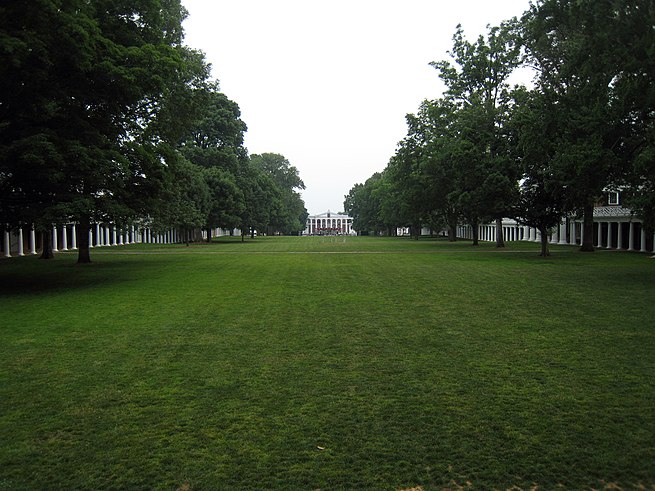
Main Difference
The main difference between Lawn and Garden is that the Lawn is a area of land planted with grasses and Garden is a planned space set aside for the display, cultivation, and enjoyment of plants.
-
Lawn
A lawn is an area of soil-covered land planted with grasses and other durable plants such as clover which are maintained at a short height with a lawnmower and used for aesthetic and recreational purposes. Common characteristics of a lawn are that it is composed only of grass species, it is subject to weed and pest control, it is subject to practices aimed at maintaining its green color (e.g., watering), and it is regularly mowed to ensure an acceptable length, although these characteristics are not binding as a definition. Lawns are used around houses, apartments, commercial buildings and offices. Many city parks also have large lawn areas. In recreational contexts, the specialised names turf, pitch, field or green may be used, depending on the sport and the continent.
The term “lawn”, referring to a managed grass space, dates to no earlier than the 16th century. Tied to suburban expansion and the creation of the household aesthetic, the lawn is an important aspect of the interaction between the natural environment and the constructed urban and suburban space. In many suburban areas, there are bylaws in place requiring houses to have lawns and requiring the proper maintenance of these lawns. In some jurisdictions where there are water shortages, local government authorities are encouraging alternatives to lawns to reduce water use.
-
Garden
A garden is a planned space, usually outdoors, set aside for the display, cultivation, or enjoyment of plants and other forms of nature. The garden can incorporate both natural and man-made materials. The most common form today is known as a residential garden, but the term garden has traditionally been a more general one. Zoos, which display wild animals in simulated natural habitats, were formerly called zoological gardens. Western gardens are almost universally based on plants, with garden often signifying a shortened form of botanical garden. Some traditional types of eastern gardens, such as Zen gardens, use plants sparsely or not at all.
Gardens may exhibit structural enhancements, sometimes called follies, including water features such as fountains, ponds (with or without fish), waterfalls or creeks, dry creek beds, statuary, arbors, trellises and more. Some gardens are for ornamental purposes only, while some gardens also produce food crops, sometimes in separate areas, or sometimes intermixed with the ornamental plants. Food-producing gardens are distinguished from farms by their smaller scale, more labor-intensive methods, and their purpose (enjoyment of a hobby or self-sustenance rather than producing for sale). Flower gardens combine plants of different heights, colors, textures, and fragrances to create interest and delight the senses.
Gardening is the activity of growing and maintaining the garden. This work is done by an amateur or professional gardener. A gardener might also work in a non-garden setting, such as a park, a roadside embankment, or other public space. Landscape architecture is a related professional activity with landscape architects tending to specialise in design for public and corporate clients.
-
Lawn (noun)
An open space between woods.
-
Lawn (noun)
Ground (generally in front of or around a house) covered with grass kept closely mown.
-
Lawn (noun)
An overgrown agar culture, such that no separation between single colonies exists.
-
Lawn (noun)
A type of thin linen or cotton.
-
Lawn (noun)
Pieces of this fabric, especially as used for the sleeves of a bishop.
-
Lawn (noun)
A piece of clothing made from lawn.
-
Garden (noun)
An outdoor area containing one or more types of plants, usually plants grown for food or ornamental purposes.
“a vegetable garden”
“a flower garden”
-
Garden (noun)
Such an ornamental place to which the public have access.
“You can spend the afternoon walking around the town gardens.”
-
Garden (noun)
The grounds at the front or back of a house.
“This house has a swimming pool, a tent, a swing set and a fountain in the garden.”
“We were drinking lemonade and playing croquet in the garden.”
“Our garden is overgrown with weeds.”
-
Garden (noun)
The twentieth Lenormand card.
-
Garden (noun)
A cluster; a bunch.
-
Garden (noun)
Pubic hair or the genitalia it masks.
-
Garden (verb)
to grow plants in a garden; to create or maintain a garden.
“I love to garden — this year I’m going to plant some daffodils.”
-
Garden (verb)
of a batsman, to inspect and tap the pitch lightly with the bat so as to smooth out small rough patches and irregularities.
-
Garden (adjective)
Common, ordinary, domesticated.
-
Garden (noun)
a piece of ground adjoining a house, in which grass, flowers, and shrubs may be grown
“children love playing in the garden”
“a garden gate”
-
Garden (noun)
ornamental grounds laid out for public enjoyment and recreation
“botanical gardens”
-
Garden (noun)
a street or square
“Burlington Gardens”
-
Garden (noun)
a large public hall
“Madison Square Garden”
-
Garden (verb)
cultivate or work in a garden
“she wrote books, kept journals, and gardened”
